
John Foxx/Stockbyte/Getty Images
The velvety texture and mild, nutty flavor of eggplant is versatile enough for any cuisine, from the silky bite of Middle Eastern baba ghanoush to the bubbly perfection of Italian eggplant parmigiana. When chosen unwisely or prepared improperly, however, eggplant can be bitter and acidic. Start with the freshest eggplant you can find, then treat it liberally with salt to bring out its luscious natural taste.
Choosing the Best Eggplant
The phenolic compounds within an eggplant may increase as the eggplant ages, making it more bitter. Take advantage of farmer's markets to purchase eggplant grown locally and sold soon after harvesting, if possible. If not, look for eggplants that have a very smooth, taut skin, because puckered skin is a sign that the eggplant is overripe. Smaller Japanese eggplants tend to be generally less bitter than the larger ones typically found in the supermarket and can be used in the same recipes.
Proper Preparation
Wash the eggplant thoroughly in warm water and slice off the stem end. Peel the eggplant and cube it if you're going to make a recipe that calls for mashed or cubed eggplant. Peel eggplant that you plan to slice for parmigiana or moussaka. Leave the peel on slices of eggplant rounds to keep their shape if you are going to bake, broil or grill them in certain dishes. For example, don't peel eggplant for use in a dish such as a caprese stack, where the rounds are layered with tomato and mozzarella cheese and served cold with pesto or balsamic vinegar.
Salt and Drain
Place sliced or cubed eggplant in a colander or sieve and salt the pieces liberally. The salt draws moisture from the eggplant and draws out the phenolic compounds that can give eggplant a bitter taste. Toss the pieces well to make sure that they are fully coated with salt and let them sit in the colander in a clean sink for 30 to 60 minutes. Rinse the eggplant pieces in lukewarm water before cooking them if you are watching the salt levels in your diet. Or press the pieces gently between layers of damp paper toweling to squeeze out excess moisture and remove a little of the salt.
Cooking Tips and Hints
Eggplants are made up of tiny air pockets that tend to absorb oil like a thirsty sponge. If you are watching your calories or fat, press the eggplant slices or cubes gently before cooking them in oil to compress the air pockets. Eggplant can also be baked, broiled or grilled dry or with just a bit of seasoned oil brushed across the top. The longer you cook the eggplant, the softer it will become and the sweeter it will taste, so don't try to correct for bitterness by adding sugar unless you are aiming for a very sweet dish.
Related Articles

Brining Eggplants

Good Eggplant Vs. Bad Eggplant
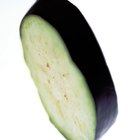
How to Dredge Eggplant
How to Grill Chayote Squash
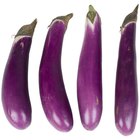
How to Prepare Hansel Eggplant

How to Cook Sweet Potatoes & Eggplant ...

Healthy Ways to Cook Eggplant

Fiber in an Eggplant
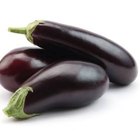
How to Clean Eggplant

Can You Bake Eggplant Instead of Frying?

How to Cook Jerusalem Artichokes

How to Oven-Dry a Bitter Gourd
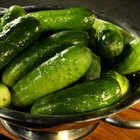
How to Make Cucumber Kimchi

Grilled Pattypan Squash

How to Thicken Mashed Squash

How Long Can You Keep Apples From ...
How to Cook Squash & Zucchini Like a ...

How to Cook a Turban Squash

Can You Substitute Asian Eggplant for ...
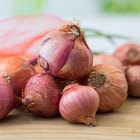
How to Store Shallots
References
Writer Bio
Brynne Chandler raised three children alone while travelling, remodeling old homes, taking classes at the Unioversity of California Northridge and enjoying a successful career writing TV Animation. Her passions include cooking, tinkering, decorating and muscle cars. Brynne has been writing fun and informative non-fiction articles for almost a decade. She is hard at work on her first cookbook, which combines healthy eating with science-based natural remedies.
Photo Credits
John Foxx/Stockbyte/Getty Images